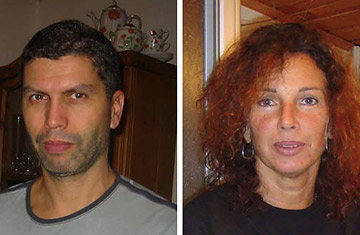
A split photo depicts the two Austrian tourists, Wolfgang Ebner, left, and Andrea Kloiber, right, who were allegedly kidnapped by an Al-Qaeda group in Tunisia.
European counterterrorism officials were not exactly surprised by news this week that Islamist radicals in north Africa have kidnapped two Austrian tourists, but they are concerned. Their monitoring over recent months has noted increasing jihadist calls to abduct foreigners as part of the wider surge of terrorist activity in the region. Some fear a spate of politically motivated kidnapping could be in the offing.
In messages that still haven't been definitively authenticated — an audio file delivered to a specialized U.S. intelligence website, and a written communiqué to an Algerian daily — the Algerian group al-Qaeda in Islamic Maghreb (AQIM) claimed responsibility this week for kidnapping two Austrian tourists on Feb. 22. A man identifying himself as an AQIM spokesman said the couple — identified by Austrian media as Andrea Kloiber, 43, and Wolfgang Ebner, 51 — were in good condition, but warned that any armed attempt to free the captives would gravely imperil their lives.
The statements called the kidnapping a direct response to "our brothers in Gaza being massacred by the Jews" of Israel. But they also contained a broader warning to "Western tourists traveling to Tunisia searching for pleasure." The missives were clearly designed to scare foreigners away from the region, thus drying up a main revenue source for the extremists' targeted regimes in Algeria, Tunisia and Morocco.
The kidnapping comes after the December killing of four French tourists in Mauritania in what intelligence officials believe was a bungled abduction attempt. In September an AQIM plot to seize two French nationals in Algiers was thwarted by security services, and the same month, a group of Italian civil engineers were captured but ultimately released in northern Mali. The growing risk of abduction or terrorist violence by jihadists in the region ultimately caused the organizers of the annual Dakar Rally to cancel the cross-desert off-road car race for the first time since was launched in 1978.
The incidence and audacity of deadly terror attacks in north Africa has risen for the past two years — particularly since Algeria's Salafist Group for Combat and Preaching (GSPC) allied itself with al-Qaeda under the AQIM name. AQIM promised to internationalize its jihad against the Algiers regime by striking out at foreign enemies, notably Europeans, and adopting trademark al-Qaeda terror and communication techniques. As part of that, French intelligence officials say, AQIM and its sympathizers in North Africa are using kidnapping to both call attention to its cause and raise money.
"The thinking is that because they've demonstrated their abilities in all the other aspects of terrorism — bombings, shootings, logistics, organization and recruitment — they now need to show they can humiliate and intimidate the enemy through kidnapping too," says a French intelligence official. "They also know abducting Westerners draws lots of media attention to them, and more often than not ends up with big ransom payments that help fund more jihadist activity."
Extremists associated with or organized by AQIM have nearly free rein in the vast territory sweeping the southern flanks of Morocco, Algeria and Libya, and over the northern sections of Mauritania, Mali and Niger. The French official says around 150 fighters traveling in four-wheel trucks move about freely in the region, running munitions and materials, training new recruits, and abducting and holding any kidnap victims. Indeed, officials are virtually certain AQIM has transported Kloiber and Ebner to northern Mali or southern Algeria, the same area where the GSPC kept 31 captured European tourists hidden in 2003 until Germany allegedly paid a ransom). But because AQIM action is driven in part by the need for ransom payments, French officials hope these terrorists are less prone to committing the beheadings of valuable hostages that has become the gruesome trademark of other terrorists in Iraq, Pakistan and Afghanistan.
France and the U.S. both have a military presence in the region to combat terror. The French official says Paris and Washington, actively working with allied north African governments, have studied air and land strikes capable of eliminating AQIM in the area. So far, the source says, they have decided that the group's nuisance does not merit massive use of force.
"You have to make sure the remedy isn't worse than the disease," says another French counterterror official, noting the relatively small number of kidnapping cases to date. "The reality is, a Western military strike on a Muslim nation today would inflame Muslim populations across the planet, turn the entire area into a land of jihad for extremists everywhere, and send scores of European youths into extremism."
